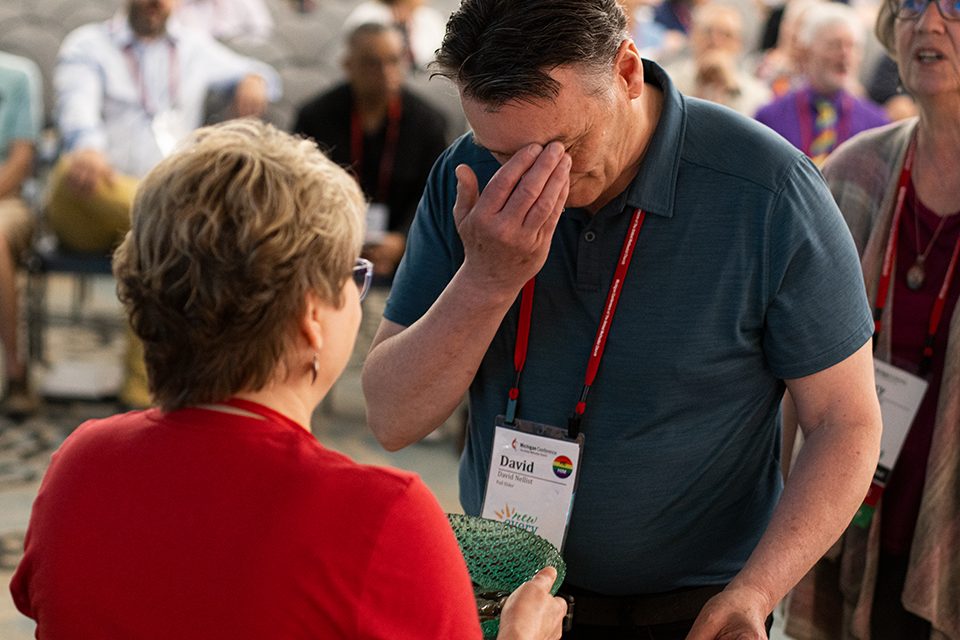Despite challenging business matters, messages of assurance and hope for renewal shaped the 2023 Michigan Annual Conference, held June 2-4 in Acme, MI.
JAMES DEATON
Content Editor
ACME, MI—Weighty matters were on the minds and hearts of United Methodists as they met June 2-4, 2023, for the fifth session of the Michigan Annual Conference of The United Methodist Church. The Grand Traverse Resort and Spa, near Traverse City, was the host venue.
This year’s gathering came at a transitional point in the life of the Michigan Annual Conference, as 1,536 clergy and lay members, along with staff and guests, met to worship God, take care of business, and celebrate mission and ministry and our calling as children of God redeemed by Jesus Christ. It was the first annual meeting since 2019 where almost all COVID-19 precautions were removed. But, in many ways, it was not a return to “normal” times.
Michigan United Methodists find themselves in an in-between space, as church members grapple with post-pandemic realities, such as attendance decline, budget contractions, the reduction of conference staff and the number of districts, and ongoing denominational disaffiliation and religious disaffiliation, and yet hold fast to God’s promises.
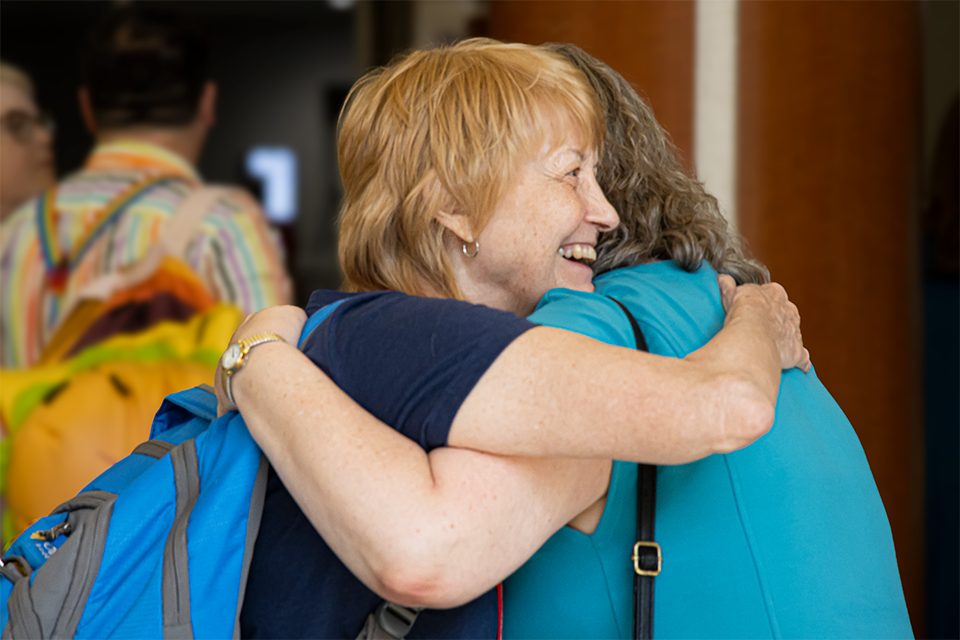
The conference theme, “New Every Morning,” taken from Lamentations 3, gave attendees scriptural reminders of God’s faithful presence amid difficulties and the renewed love and strength God gifts each day. This powerful message of assurance and hopefulness was woven through the liturgy, hymns, sermons, Bible study, and prayers throughout the conference.
There were also reminders of our belovedness in God’s eyes and our identity in Christ through baptism. Despite societal, cultural, and even religious forces that try to tear the body of Christ apart, nothing can separate us from who we are in Christ, individually and together.
An emphasis on the key tasks of renewal and reclaiming who we are as United Methodists—our unique approach to Christian discipleship—and our mission to make disciples of Jesus Christ for the transformation of the world was punctuated through mission and ministry highlights and in the Service of Recognition, Commissioning, and Ordination on Saturday evening.
And throughout the 2023 Michigan Annual Conference, attendees acknowledged a generosity of spirit that was palpable at times, as the Holy Spirit moved and gave space for grace and forbearance during tough conversations and debates. This Pentecostal spirit brought moments of hopefulness and healing that felt like unexpected gifts.
Spiritual Grounding: Finding Assurance and Identity in Christ
Conference attendees heartily welcomed Bishop David Alan Bard back as the presiding bishop of the Michigan Conference. He had been assigned to return to Michigan, through this quadrennium, until August 31, 2024, following last fall’s North Central Jurisdictional Conference.
Bishop Bard emphasized the conference theme of “New Every Morning” and God’s assured purpose for us through his pastoral leadership during worship and business.
In his opening sermon (click here to watch or click here to read), Bishop Bard acknowledged the difficult path we have been on as United Methodists in the Michigan Conference. He quoted the Woody Guthrie folk song “Hard Travelin’” and then gave a clear look at why this road has been so terribly hard lately.
Michigan United Methodists have faced post-pandemic realities of church life, disaffiliation of churches and withdrawal of pastors, broader religious disaffiliation occurring in the U.S., conference budget and staffing cuts, societal and political polarization, and racialized thinking that slows or blocks the important work of building beloved community.
Bard noted that we must be honest that this has been “hard travelin’,” and the grief, pain, and weariness have been real and often debilitating. Sometimes putting one foot in front of the other is the best we can offer. The bishop then asked his listeners to surround each other with care and compassion. He said, “Might we hold one another in a measure of grace and kindness in these difficult days, assuring one another of our belovedness.”
On this hard road, we find Jesus with us, said the bishop, just as Jesus came to the disciples in their grief on the road to Emmaus after the resurrection. “Jesus does not shy away when we are weary, lonely, confused, grieving, hurting, wounded, disappointed, discouraged. Jesus joins us on the road. We hear his whisper in our hearts. The morning breaks, the shadows flee.” Bard quoted Charles Wesley’s hymn “Come, O Thou Traveler Unknown” to make his point.
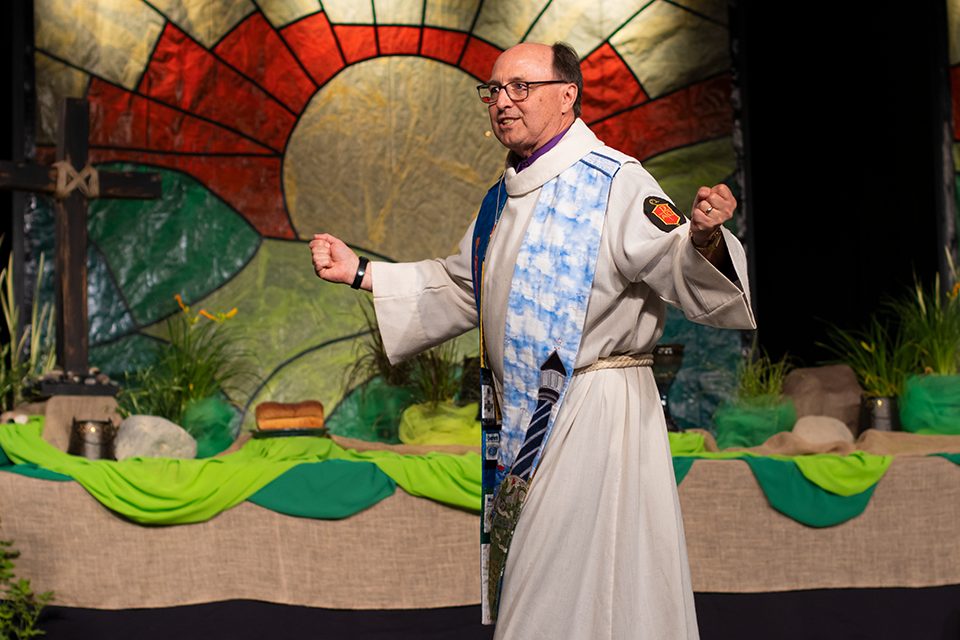
The bishop reminded his listeners that Jesus ignited a fire in the disciples’ hearts while he was with them, after he taught, broke bread, and blessed. And then, when Jesus suddenly disappeared, the disciples asked one another, “Were not our hearts burning within us?”
And just like the disciples, we are on this hard road with Jesus, and our hearts are burning as we face the challenges of being disciples in this present age. “Doesn’t the presence of Jesus with us,” asked Bard rhetorically, “reignite our passion for mission and ministry, for evangelism, for reaching out to feed the hungry, to provide shelter, to educate children? Doesn’t the presence of Jesus with us reignite our passion to seek justice, to pursue beloved community?”
Bard concluded his sermon by tying things back to the Lamentations scripture the conference theme is based on and the present reality of our hard travelin’: “So, despite the tension and struggles within The United Methodist Church, despite the fact that disaffiliation disappoints and drains, we trust that God is not yet done with The United Methodist Church, we trust that God is not done with the Michigan Conference, because new every morning is God’s love.”
Following Bard’s sermon, God’s table was set for Holy Communion, and the bishop presided. It was the first time the Michigan Conference had shared the sacrament since 2019. As some members received elements of bread and juice—for some, possibly the last time together—the scene was a poignant reminder of our bond as the body of Christ through the sacraments and the continued presence of Christ among us.
A sought-after speaker, Rev. Grace Imathiu, senior pastor of First UMC, Evanston, IL, was the conference’s guest teacher and preacher and continued the theme of assurance of God’s presence in difficult times during her Saturday morning Bible study (click here to watch). Through a retelling of the story of Jacob in Genesis 37–45, Imathiu preached on the trauma that we’re living with in these post-pandemic times. We have been through a lot with so many societal and religious paradigm shifts happening so fast in such a short time. She confessed, “We’ve done 40 years of exile in three years, and we are exhausted.”
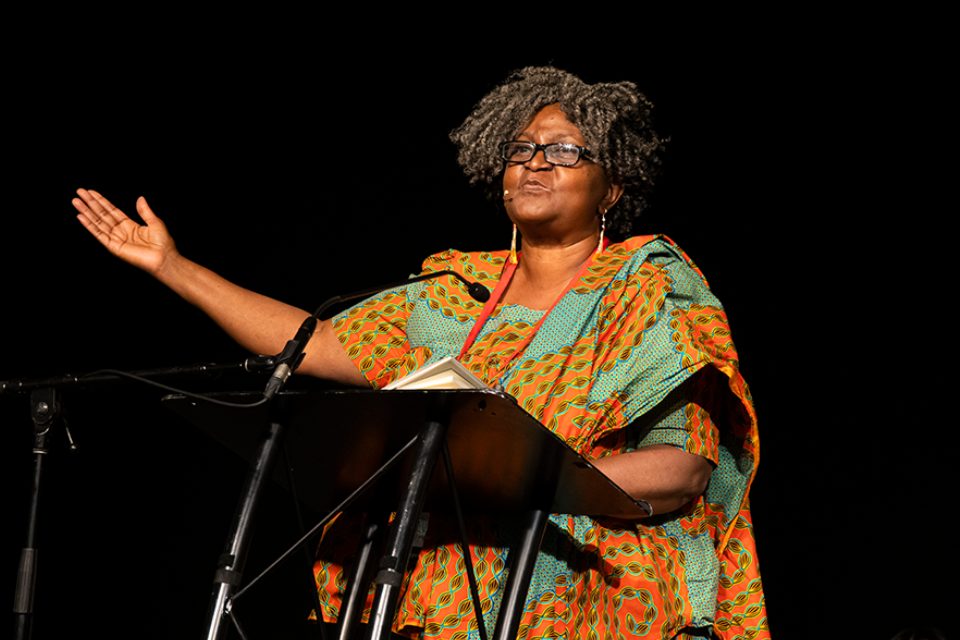
Imathiu reminded her listeners that the story of Joseph and how he was reconciled with his brothers is about God and how God works in our lives, bringing life into places of barrenness. She proclaimed, “The desert cannot stop God. A pandemic cannot stop God. Disaffiliation cannot stop God. We are talking about a God who blesses Joseph in the land of his misfortune.”
Joseph eventually experienced God’s healing when he revealed himself to his brothers, who did not recognize him, and then opened the door to lament. The scripture says, “And [Joseph] wept so loudly that the Egyptians heard it, and the household of Pharaoh heard it” (Gen. 45:2).
As God broke through the numbness of self-deception and despair, causing Joseph’s armor of anger to fall, Imathiu explained, Joseph could now grieve and lament so that healing and forgiveness could begin. “Then Joseph said to his brothers, ‘Come closer to me.’ And they came closer. He said, ‘I am your brother, Joseph, whom you sold into Egypt’” (v. 4).
Imathiu concluded her teaching by asking conference attendees also to see Joseph’s story about the danger of privilege, of seeing our story, our history, as the only one worth telling. She recalled her favorite scene in the Netflix series The Crown, where Princess Elizabeth flies into Nyeri, Kenya, in 1952. Looking down from her view on the plane, the princess did not know what Joseph discovered in his revelation, that power is not the important thing. In these difficult times, Imathiu said, “our relationship with one another is everything. So, [with Joseph, let’s say] come closer! That I might look into your eyes and see my sibling.” Coming close and opening ourselves up causes something to shift inside, creating space for one another.
These themes of blessedness and belovedness as God’s children were echoed in Rev. Imathiu’s sermon on Sunday morning (click here to watch). She preached on the difficult text of Jesus healing the Canaanite woman’s daughter possessed by demons (Matthew 15:21-28). She wove themes of assurance of our belovedness in God’s eyes and our identity in Christ through baptism.
Rev. Imathiu spoke of the Canaanite woman’s boldness as a non-Israelite outsider, taking great risks to approach Jesus on behalf of her sick child. The desperate mother pressed Jesus to help her even though he admitted he had come for others. But the Canaanite woman wouldn’t take no for an answer and confessed that she believes God’s table is abundant and is willing to take the crumbs that fall from it. Because of this mother’s faith, Jesus heals her daughter.

Imathiu ended her sermon by telling a surprising story about an acquaintance that asked to be baptized on a car ride in Kenya. The request caught Imathiu off guard, similar to the Canaanite woman approaching Jesus. Imathiu then reminded her listeners of their belovedness in God’s eyes through baptism, no matter where they find themselves after Annual Conference. She said, “Whether you stay or whether you leave, our baptism stays with us, and we belong to God.”
Following the sermon, all were invited to come forward to dip their fingers in bowls of water and take one of the lakeshore stones lining the bowls as reminders of their baptism in Christ.
Hard Travelin’: Doing the Business of the Church
The spiritual grounding experienced during worship and Bible study grounded clergy and laity members as they waded through the hard work of legislation and business placed before them.
Disaffiliation, Closings, Redistricting
One of the most significant business matters before the Michigan Annual Conference this year was related to the disaffiliation of churches, which was addressed during the corporate business session on Saturday afternoon.
Rev. Carolin Spragg, chair of the Board of Trustees, outlined the business for members and noted that disaffiliation had been a large part of the board’s work over the past year. She then introduced Rev. John Boley, special assistant to the bishop, who has guided congregations through the legal and administrative steps once a church had voted to leave the denomination, according to the provisions in Paragraph 2553 in The Book of Discipline.
Paragraph 2553, which will expire on December 31, 2023, gives a path for those wishing to leave as a matter of conscience related to the direction that The United Methodist Church is heading on matters of full inclusion of LGBTQIA+ persons in the life of the church. The Michigan Conference Board of Trustees created a process for churches leaving that is fair and equitable.
Before Boley presented the motion for disaffiliation and fielded questions, Spragg noted that if a church on this list fails to complete the requirements by July 1, 2023, there will be a final chance at the November 30 special session of the annual conference where a vote will be taken.
In his remarks, Boley noted that walking churches through this process and answering questions has taken a team and then thanked some of them. He said, “The bishop and Jennie [Browne] have set the tone that we would do this amicably and cooperatively and in a Christian spirit.” He especially thanked the district superintendents, who have been “on the front lines” of this process, going into churches, answering questions, and holding church conferences when a vote was taken.
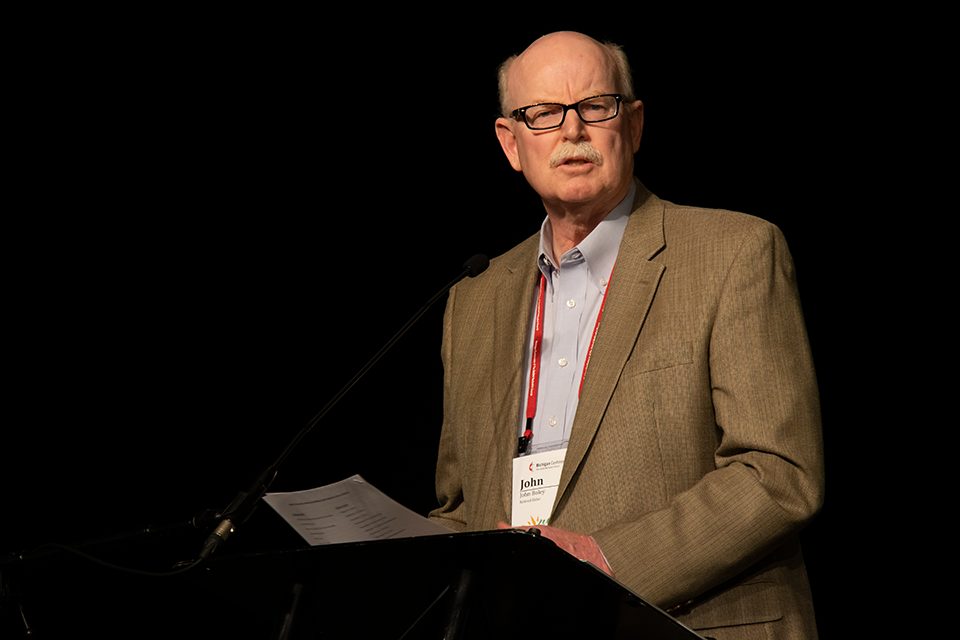
As the disaffiliation motion was presented, the floor was opened to questions and comments, and there were a few emotion-filled responses. There were comments acknowledging how this was a sad moment for the Michigan Conference, requests for prayer, reminders to respect people’s choices to stay or leave, and an expression of gratitude for The United Methodist Church and how it was instrumental in leading this person to Christ.
The Michigan Conference passed the motion to approve the disaffiliation of 60 congregations that have voted to leave the Michigan Conference and The United Methodist Church. This represents about 8% of the 721 churches within the conference. A large percentage of these churches are leaving to join the Global Methodist Church, which was formed in May 2022.
The list of 60 churches disaffiliating as of July 1, 2023, includes:
-
- Central Bay District: Caseville UMC, Elkton UMC, Hale: First UMC, Midland: Aldersgate UMC, Pigeon: Salem UMC, Tawas UMC, Wisner UMC
- East Winds District: Applegate UMC, Attica UMC, Buel UMC, Byron: First UMC, Cole UMC, Croswell: First UMC, Dryden UMC, Durand UMC, Holly: Calvary UMC, Imlay City UMC, Lamb UMC, Lennon UMC, Marlette: First UMC, McGregor UMC, Melvin UMC, Memphis: First UMC, Montrose UMC, Omard UMC, Ortonville UMC, Port Huron: Gratiot Park UMC, Richfield UMC, Seymour Lake UMC, South Mundy UMC
- Greater Detroit District: Fraser: Christ UMC, Korean of Metro Detroit UMC, Korean First Central UMC
- Greater Southwest District: Arden UMC, Battle Creek: Maple UMC, Berrien Springs UMC, Buchanan: Faith UMC, Dowling: Country Chapel UMC, Pokagon UMC, Scottdale UMC, Wakelee UMC
- Heritage District: Dexter UMC, Highland: Thrive UMC, LaSalle: Zion UMC, Lee Center UMC, Weston UMC
- Mid-Michigan District: Beebe UMC, Corunna: Northwest Venice UMC, Lake Odessa: Lakewood UMC, Lowe UMC, Pittsburg UMC, St. John: Pilgrim UMC
- Midwest District: Carlisle UMC, Grand Rapids: Cornerstone UMC, Leighton UMC
- Northern Skies District: Iron Mountain: First UMC, L’Anse UMC, Mackinaw City: Church of the Straits UMC, Pickford UMC
- Northern Waters District: Houghton Lake UMC
In a related business matter, during the closed clergy session on Thursday afternoon, clergy members approved the withdrawal of 13 ordained clergy (full elders/full deacons) and nine local pastors who have chosen to leave The United Methodist Church.
Bishop Bard, who was presiding during the corporate session, made a comment that echoed earlier statements in his State of the Conference report, where he noted that the term “disaffiliation” will disappear from The Book of Discipline at the end of this year. And even though those provisions will go away, the bishop gave assurance that a path for leaving the denomination similar to the provisions in Paragraph 2553 will likely be put in place following General Conference. The terms and details, however, will not be determined until General Conference, scheduled for April 23–May 3, 2024, in Charlotte, NC.
Also, in his State of the Conference report, Bishop Bard said there would be a moratorium on disaffiliations between January 1, 2024, and General Conference. And, related to those churches disaffiliating, he explained that he had made provisions for retired clergy to be hired but not appointed to serve churches of other denominations. He said, “In all this, my intent is to combine kindness and fairness with clarity and firmness.”
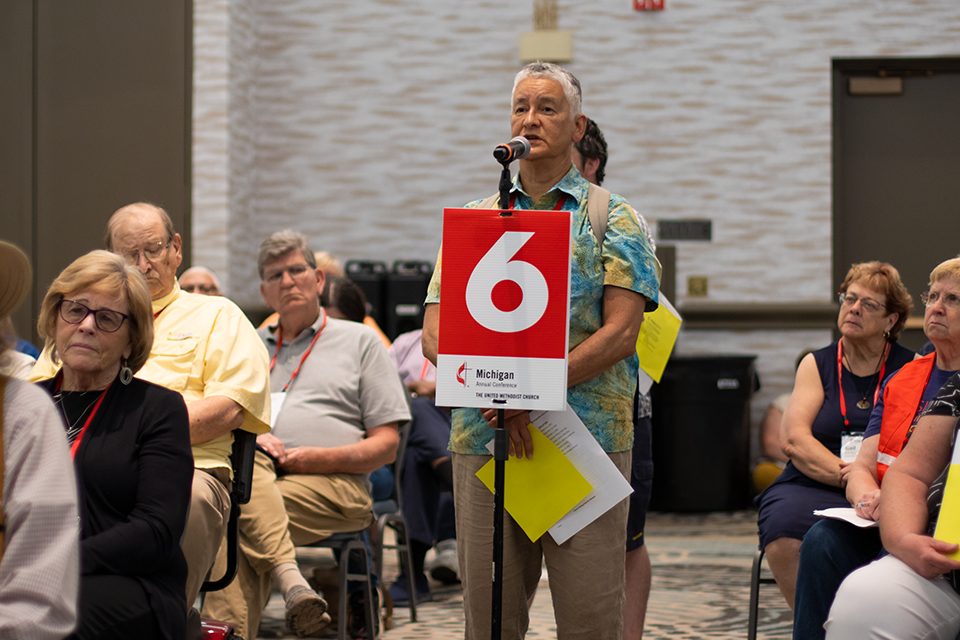
Returning to Saturday’s corporate session, Rev. Margie Crawford, Dean of the Cabinet, solemnly presented the names and stories of the nine churches that have closed since the last annual conference session, and members voted to accept their closure. The list of nine closed churches includes: Bentley UMC (Central Bay), Williamston: Wheatfield UMC (Mid-Michigan), Mohawk-Ahmeek UMC (Northern Skies), Dimondale UMC (Mid-Michigan), Jackson: Zion UMC (Heritage), Sears UMC (Northern Waters), Silverwood UMC (East Winds), Saginaw: Ames UMC (Central Bay), and Worth Twp: Bethel UMC.
The redistricting plan reducing the number of districts from nine to seven was also approved, effective July 1, 2023. This includes the merger of the Northern Waters District with the Midwest District, with the name changing to the Western Waters District, and the merger of the Mid-Michigan District and the Heritage District, with the Heritage District name being retained.
To close the corporate session, a visibly moved Bishop David Bard named the weight of the business but urged members not to wallow in it. God is still calling the Michigan Conference, in Jesus Christ, to live out God’s love. “The challenge before us is still there,” he said, “to reclaim the adventure and curiosity of our Methodist tradition, to reclaim the emphasis of Methodism on helping people deepen and grow in their faith, to reclaim a faith that does good. So, my prayer for all of us is, ‘Lord, renew your church.’”
Resolutions and Petitions
Diane Brown, Legislative Coordinator for the Michigan Annual Conference, guided voting members through the various resolutions submitted for consideration. There were eleven annual conference resolutions (along with amendments) and one General Conference petition to work through during the plenary sessions.
One legislative item, R#2023-4: “A Call to Promote Justice for Palestinians,” was on the consent calendar, which means it passed by nine-tenths of the legislative committee, and was then passed by voting members during the first plenary session on Friday afternoon.
The resolution had been submitted by the Conference Board of Justice’s newly created Task Force Promoting Justice in the Middle East. It urges Michigan United Methodists to promote justice for Palestinians in the Holy Land and take action to resist unjust policies that cause harm and death to Palestinian people, especially the children, in the West Bank, Gaza, and Israel.
This resolution outlined an action plan for all Michigan United Methodists, which includes (1) taking the resolution back to their home congregation, (2) engaging their congregation in study and discussion of Cry for Hope: A Call to Decisive Action, and learning more about the Palestinian struggle with resources from the General Board of Church and Society and the United Methodist Kairos Response, (3) finding a member in their congregation to be a contact person with the conference task force, and (4) asking that contact person to inspire members to advocate for the human rights of the Palestinians, especially the children.
More details on implementing this resolution and next steps for congregations will be published in future issues of MIconnect.
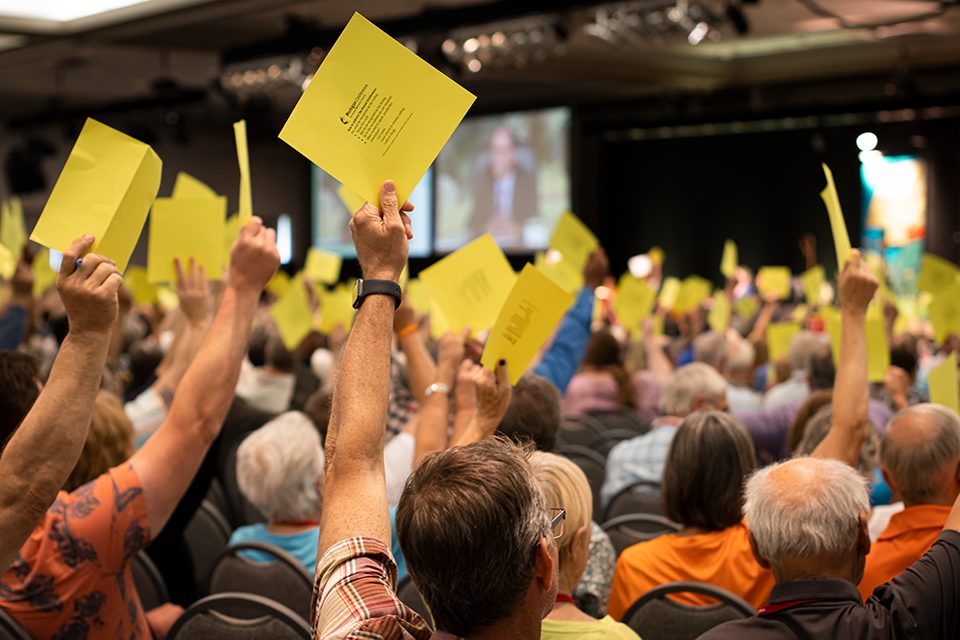
Two legislative resolutions were withdrawn by those who submitted them: R#2023-4, “Third Grade Reading Efficiency in Local Communities,” and R#2023-10, “Recognize the Unborn Baby.”
The 2023 Michigan Annual Conference approved the remaining eight pieces of legislation during the plenary sessions:
-
- Three dealt with topics related to salaries and benefits. Two resolutions (R#2023-1 and 2) came from the Michigan Conference Board of Pension and Health Benefits related to the Past Service Rate for the Ministers’ Reserve Pension Fund and the Housing/Rental Allowance for retired or clergy on medical leave status. And one resolution (R#2023-11) from the Commission on Equitable Compensation dealt with the 2024 Minimum Salary Schedule.
- R#2023-3 came from the Michigan Conference Commission on Archives and History concerning recent conference budget cuts in funding. The passing of it ensures that future conference budgets will include this commission’s work.
- Three aspired to affirm actions taken at the November 2022 North Central Jurisdictional (NCJ) Conference. All five U.S. jurisdictions adopted all three NCJ resolutions last fall. R#2023-5 addressed the desire to support the formation of a U.S. Regional Conference. R#2023-7 affirmed the resolution “Queer Delegates’ Call to Center Justice and Empowerment for LGBTQIA+ People in The UMC.” And R#2023-8 affirmed the resolution “Leading with Integrity,” which discusses disaffiliation and continuing leadership within The United Methodist Church.
- The last annual conference resolution, R#2023-9, addressed proposed General Conference legislation. This resolution asked the Michigan Conference to support the removal of all discriminatory policies and harmful language related to sexual orientation, and urged delegates to adopt petitions working to remove such language.
One final piece of legislation voted on by members was a General Conference petition that Rev. Rich Peacock had submitted. He proposed a resolution to be added to The Book of Discipline’s Social Principles concerning peacemaking and the prohibition of nuclear weapons. The Michigan Annual Conference passed this petition, and it will be sent now as an endorsed resolution to be considered by delegates at General Conference.
2024 Annual Budget
On Sunday morning, Rev. Brad Bartelmay, President of the Michigan Conference Council on Finance and Administration, presented the 2024 Annual Budget, a 20.1% reduction from the 2023 Annual Budget, for approval by members of the Michigan Annual Conference.
Bartelmay referred to Bishop Bard’s comments in the State of the Conference report, where the bishop spoke honestly about the post-pandemic financial difficulties the conference has gone through, partly because of disaffiliation and church closings but also because of declining Ministry Shares revenue that comes from churches (receipt rate is approximately 72%).
One of the painful repercussions of a reduced budget was the difficult decision to reduce and restructure conference staff, which was announced earlier this year. Bishop Bard, in his earlier State of the Conference report, said: “Budgets are not just numbers. There are people involved, and making staff changes in line with the budget has been challenging and painful. By the end of the year, Sonya Luna, Paul Perez, Brittney Stephan, Christy Miller White, Dirk Elliott, and Alice Townley will no longer be on the Michigan Conference staff.” The bishop encouraged Annual Conference members to express their appreciation during the week for their good work.
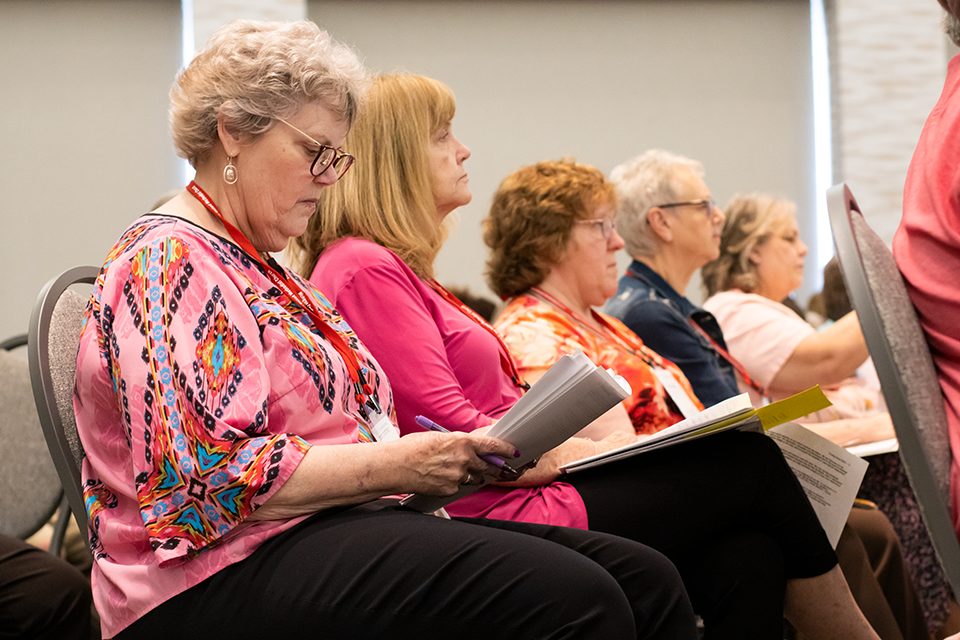
Conference members voted to approve the $9,272,698 budget for 2024 (a 20.1% reduction from the previous year). The Benefits Ministry Shares Budget (pension/welfare payments to Wespath and to fund the operational costs of the Benefits Office) is $3,400,000, a decrease of 5.6% from the prior year. Staff salaries will include a 3% increase.
To conclude his report, Bartelmay shared some personal reflections as his time as council president is ending. Rev. Leslee Fritz will become the next president. Bartelmay spoke about numbers not defining who we are as Michigan United Methodists. “We are defined by a God whose accounting goes like this, ‘You will be more numerous than the stars in the heavens and the grains of sand upon the shore.’ . . . That is the accounting of our faith. Michigan United Methodists, you are so much more than numbers on paper, so much more. Amen.”
Hearts on Fire: Celebrating Mission and Ministry
The hard matters of conference business did not overshadow the powerful witness of God’s presence and the love of Christ in the lives of Michigan United Methodists. As Bishop Bard said in his sermon during opening worship, Jesus is with us on this road, and he has reignited “our passion for mission and ministry, for evangelism, for reaching out to feed the hungry, to provide shelter, to educate children . . . [and] to seek justice, to pursue beloved community.”
Reporting on Mission
Various reports on mission engagement were given throughout the 2023 Michigan Annual Conference, which exemplified this passion for good works done by faith.
On Saturday, Rev. Jon Reynolds and Lisa Batten, co-chairs of the Readers to Leaders fundraising campaign, announced that the campaign has been extended for another year, concluding at next year’s Annual Conference. The campaign supports students participating in the Michigan Conference’s Children’s Defense Fund (CDF) Freedom School Program, which improves reading retention for students during the summer months, and students attending four United Methodist schools in Liberia.
To date, more than 150 Michigan United Methodist churches have given to the life-giving campaign, with more than $185,000 collected. Reynolds thanked the conference for its generosity and asked each Michigan congregation to move the campaign forward by giving at least $600 between now and next year’s conference to meet their goal (learn how to give here).
Reynolds spoke about recently visiting Liberia, where education is vital to this country’s future. A young person receiving an education can transform not only the life of the student but their families and communities. Education can save them from poverty and secure better employment.
Readers to Leaders is planting seeds for a later harvest, with the hope that raising up young leaders in Liberia will change lives in the long run. Reynolds said, “I hope that someday, one of these students will grow up to serve in the government of Liberia. I hope they become pastors and teachers and missionaries. I hope that someday somebody comes to our Annual Conference thirty or forty or fifty years down the road and preaches a message like Grace [Imathiu] gave us this morning that says to us that we can turn mourning into dancing.”
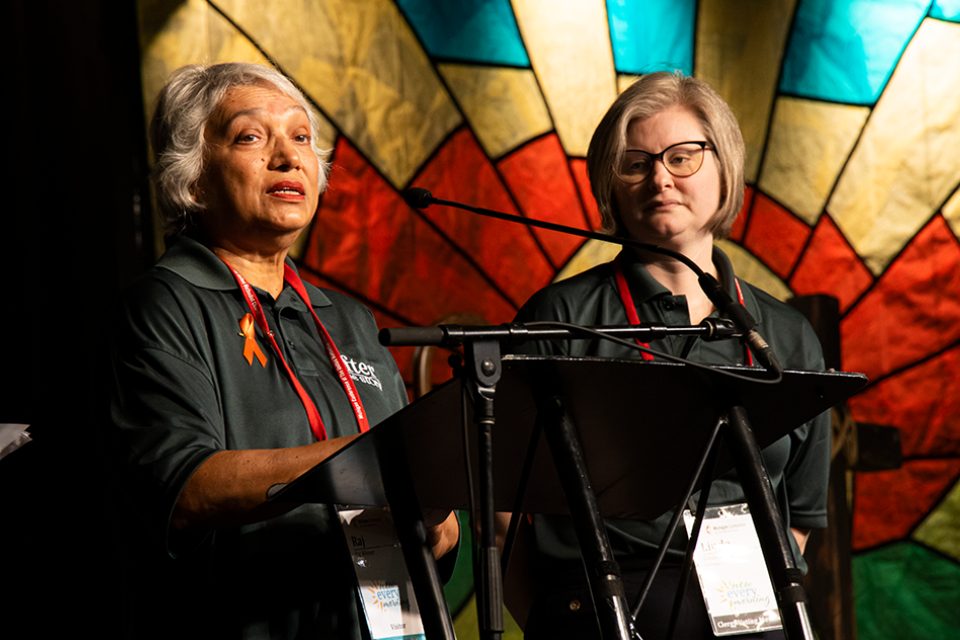
Reynolds also reminded his listeners that donations would not only send children to school in Liberia but also install toilets in each of the four United Methodist schools in Liberia.
On Sunday morning, four reports were given related to advocacy and mission. Rev. Alice Townley led a conversation with three others on the Michigan Conference’s first Advocacy Day in Lansing. More than 300 United Methodists met with state lawmakers on March 22, 2023, to encourage them to support three key pieces of gun safety legislation on safe storage, universal background checks, and extreme risk protection orders (ERBO), or “red flag laws.” The state legislature approved all three bill packages supported on Advocacy Day, and the bills were eventually signed into law by Michigan Governor Gretchen Whitmer, effective March 2024.
Dubbed the “Methodist Miracle,” Advocacy Day was one component of a resolution passed at the 2022 Michigan Annual Conference asking United Methodists to do something to reduce gun violence in the state.
Rev. Heather McDougall-Walsh, convenor for the Michigan Conference Gun Safety Coalition, talked about the next implementation steps. “We started a good thing, and God is not finished with you yet,” she reminded her listeners. The coalition is offering training on how churches can host conversations and raise up community educators and implementers to work with various community groups so they understand the laws and comply with them.
Leadership from After the Storm, the affiliated nonprofit launched by the Michigan Conference last year, reported on the good news they bring to survivors following a disaster. After the Storm has become a leader in disaster case management here in Michigan, trusted by many.
Most recently, After the Storm’s case managers have assisted hundreds of families in Detroit following the widespread flood of June 2021 and Gaylord in response to the May 2022 tornado. Case managers give care, empathy, and spiritual support to families amid devastating crises.
Since the nonprofit is in its infancy, After the Storm leaders reported that the next 12 months are critical for long-term sustainability. So, the plan is to fundraise over the next year to raise operational funds to prepare for those fallow times when there are no disasters and grant funding is unavailable. Their goal is to raise $600,000 by next year’s Annual Conference.
To make this happen, Rev. Linda Stephan, After the Storm board member, noted that After the Storm is looking for a team of 100 people to donate or fundraise at least $1,000. Together, they would seed $100,000.
Stephan concluded her comments by touching on the ways mission brings us together: “At the end of this conference, it is not what divides us that is memorable; it is the mission that unites us and transforms our communities, bringing hope. And this is what we Michigan United Methodists are all about—yesterday, today, and, may it be so, God be praised, tomorrow.”

Rev. Jack Amick, Director of Global Migration for UMCOR, was present to celebrate the generous spirit of the Michigan Conference as it relates to mission giving. He spoke about the powerful connectional ties that every United Methodist church has through the Board of Global Ministries and The Advance, which ensures every gift is used for its intended purpose.
In 2022, the Michigan Conference gave more to The Advance—$2,141,377.50—than any other annual conference and supported 28 missionaries—more than any other annual conference.
Rev. Alex Plum, deacon and chair of the Michigan Conference Board of Global Ministries, led a group of ministry leaders in conversation about how they are nurturing ministries of healing and wholeness through their congregations. Feeding ministries at The Gathering in Harrison and the Pawating Elders Program at Northlawn UMC in Grand Rapids, MI, were highlighted, along with a refugee resettlement ministry through Portage: Chapel Hill UMC.
Giving for Mission and Ministry
Several offerings were received throughout the conference as a reminder of the generosity of Michigan United Methodists, particularly toward missions. During the opening worship service, a $40,084 offering was collected (donations continue to be accepted through this secure link).
Haitian Assets for Peace International (HAPI) will receive 45% of the total offering. The Bishop Judith Craig Children’s Village in Liberia will also receive 45% of the total offering. Both of these nonprofits are international EngageMI Ministry Partners of the Michigan Conference. Bishop Bard has also designated a 10% tithe of the offering to go to After the Storm.
A separate offering of $3,635 was received for the Ministerial Education Fund (MEF), which will provide funds to assist seminary students with educational expenses.
Doing Mission
On Friday morning, some 150 conference attendees packed 5,000 rice meal packs for hunger relief, thanks to sponsorship by the Board of Global Ministries and coordination by Midwest Mission, who will ship them worldwide. Recent shipments have gone to Ukraine.
Michigan United Methodists had donated $10,000 to purchase the rice meal packs (at $2/pack) for this first-time event. Each meal pack contains a well-balanced meal. When combined with hot water, each pack feeds six people. So, when multiplied, 30,000 people will receive a nutritious meal thanks to the Michigan Conference.
Two other activities related to raising money for mission and ministry included the 7th annual 5K for child hunger relief in Michigan, which raised $5,191 this year (more will be given through local events), and the Golf Scramble, with proceeds going directly to campus ministries.
Equipping for Ministry
Ministry leaders—both laity and clergy—had opportunities for renewal and challenge during the 2023 Michigan Annual Conference.
Kimberly Daniel, Senior Director of Communications at the Forum for Theological Exploration (FTE), was the guest speaker for Friday afternoon’s Laity Perspective event.
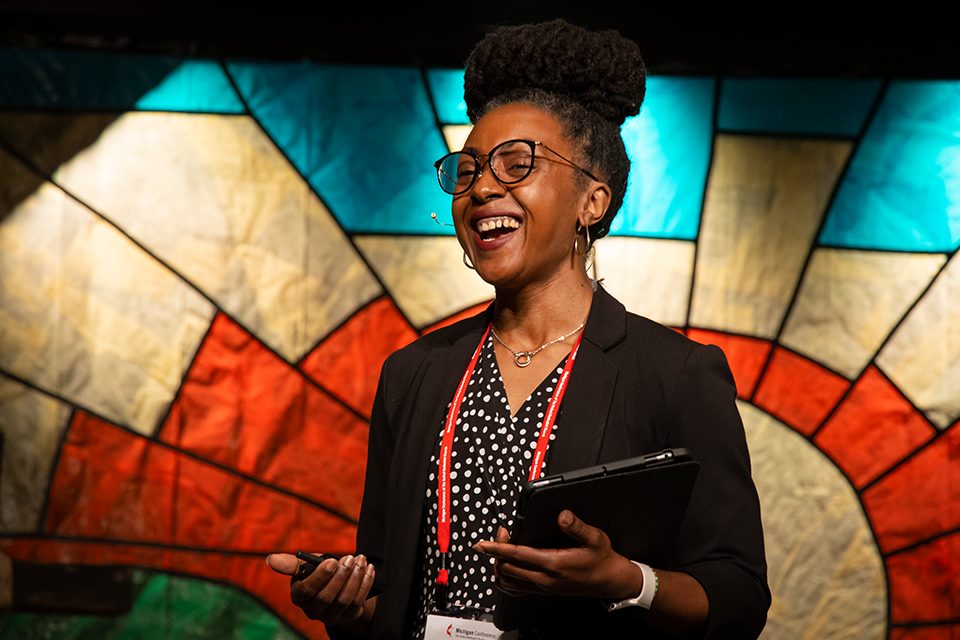
She challenged the laity to be open to cultivating Christian innovation in ministry to their communities. In response to so much suffering and despair in the world, Christian innovation is always intertwined with a strong sense of hope. Daniel defined Christian innovation as that type of innovation that advances life more abundantly (John 10:10), results in human flourishing and well-being (1 Cor. 12:25), and heals lives and communities (Rev. 22.2).
Daniel said it’s innovation grounded in the life and teachings of Jesus, coming alongside and healing all God’s people. “Christian innovation,” she continued, “is not about the self-preservation of an institution, a building, a program, or a church for the sake of staying relevant.” Instead, it’s centered on people and communities of people.
Daniel ended her presentation by giving three steps lay ministry leaders can follow as they begin to think and act creatively and innovatively: (1) get curious, for new visions emerge when we get curious; (2) make meaning by reflecting, reckoning, and interpreting what emerges; and (3) be open to the ideas and ways that God is speaking to you and through others.
Clergy were inspired and affirmed during the Service of Recognition, Commissioning, and Ordination on Saturday evening (click to view worship booklet and complete list of names with bios). In his sermon (click here to read), Bishop Bard noted that this service is also special for the entire clergy community of the Michigan Conference. He said, “It is a time when we renew our commitments to our own calling.”
Finding analogies within jazz, the bishop spoke of the necessary task each person has to find their voice or instrument, hone their improvisational skills, and incarnate creativity in a world that desperately needs it. He said, “We want to be the kind of people who, in our ministry and leadership, help create the symphony of God’s voice, being our best, bringing out the best in others.”
Eight were ordained as elders, three were commissioned for the work of an elder, three elders were transferred as full members, and nine were recognized for completing the Course of Study (click to see full list).
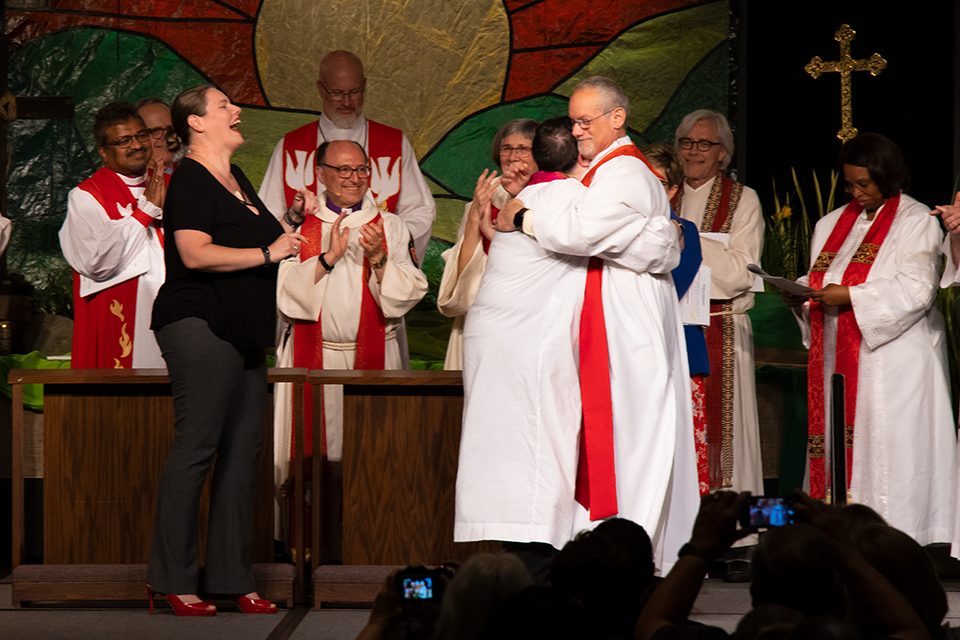
During the clergy retirement session on Thursday evening, 29 retirees (click to see full list) were recognized for their service on behalf of Christ’s church. Three of these were conference staff members recognized during the conference: Two district superintendents—Rev. Jerry DeVine, Mid-Michigan District, and Rev. John Hice, East Winds District—and the Director of Benefits and Human Resources, Rev. Don Emmert.
At the end of the final plenary session, Bishop Bard recognized four individuals receiving special recognitions or awards:
-
- Harry Denman Award for Evangelism—Pastor Pam Harkema. The Harry Denman Evangelism Award program honors United Methodists in each annual conference whose exceptional ministry of evangelism brings people into a life-transforming relationship with Jesus Christ.
- One Matters Award—French United Methodist Church in Birmingham, MI, and Rev. Gertrude Mwadi Mukalay. Discipleship Ministries presents this award to the pastor and lay leaders of a congregation that has done significant work to grow their ministry, turning zeros from previous years into positive numbers.
- Francis Asbury Award—Rev. Carl Gladstone. The award recognizes United Methodists who have made a significant contribution to fostering United Methodist ministries in higher education at the local, district, or annual conference level. It is awarded annually to one honoree per annual conference.
- John Buxton Award—Rev. John Boley. The John Buxton Award honors creative problem-solving in our annual conference.
Annual Conference Statistics for 2022
The official statistical report from Pamela Stewart, Conference Statistician, noted these trends, including a sharp increase in worship attendance likely due to the return of in-person worship for many congregations following the availability of COVID-19 vaccines.
Also, statistics for worship attendance include in-person and virtual/online worship. The General Council on Finance and Administration started collecting virtual attendance in 2020.
-
- Membership in 2022 was 102,310, down 3,633 or 3.4% from 2021
- Average Worship Attendance in 2022 was 74,866, up 39,555 or 52.8% from 2021
- Sunday School Attendance in 2022 was 7,750, up 689 or 8.9% from 2021
- Professions of Faith in 2022 were 1,306, up 204 or 15.6% from 2021
- Adults/young adults in small groups in 2022 numbered 23,135, down 279 or 1.2% from 2021
- Mission Engagement in 2022 was 26,847, down 480 or 1.7% from 2021
Last Updated on June 13, 2023

